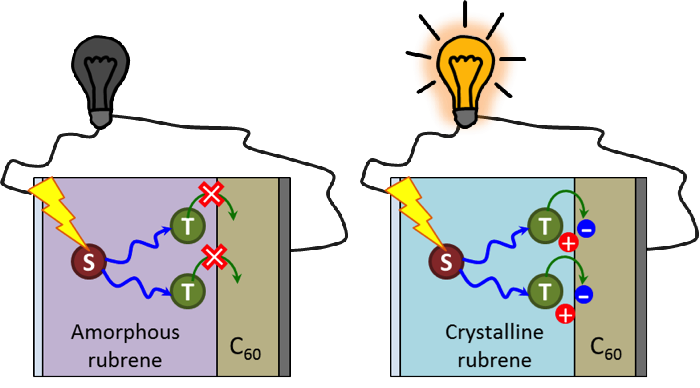One makes two: collecting triplet excitons in organic solar cells
Effective organic solar cells rely on the ability to split photogenerated electron-hole pairs (so‑called excitons) at the interface between donor- and acceptor-type materials. Some organic materials exhibit efficient singlet fission, or singlet-to-two-triplets conversion, leading to the possibility of higher efficiencies than would otherwise be possible. Therefore, materials and methods are needed to utilize triplet excitons via their direct dissociation to charges at the interface.

The Optical Condensed Matter Physics group (the Zernike Institute for Advanced Materials), together with colleagues from Princeton University (USA) have demonstrated that triplet exciton harvesting in rubrene/C60 bilayer solar cells can be dramatically enhanced by tuning the morphology of the rubrene layer. Using a combination of time-resolved photoluminescence quenching technique, external quantum efficiency measurements and photoelectron spectroscopy they have shown that in amorphous rubrene/C60 system triplet harvesting is blocked, while after rubrene crystallization it becomes extremely efficient. The results obtained demonstrate the possibility of creating organic solar cells with quantum efficiency exceeding 100%.
The results of this work are published in Advanced Functional Materials: YunHui L. Lin, Michael A. Fusella, Oleg V. Kozlov, Xin Lin, Antoine Kahn, Maxim S. Pshenichnikov and Barry P. Rand, “Morphological Tuning of the Energetics in Singlet Fission Organic Solar Cells”
| Last modified: | 07 July 2016 1.22 p.m. |
More news
-
24 March 2025
UG 28th in World's Most International Universities 2025 rankings
The University of Groningen has been ranked 28th in the World's Most International Universities 2025 by Times Higher Education. With this, the UG leaves behind institutions such as MIT and Harvard. The 28th place marks an increase of five places: in...
-
05 March 2025
Women in Science
The UG celebrates International Women’s Day with a special photo series: Women in Science.
-
16 December 2024
Jouke de Vries: ‘The University will have to be flexible’
2024 was a festive year for the University of Groningen. In this podcast, Jouke de Vries, the chair of the Executive Board, looks back.
